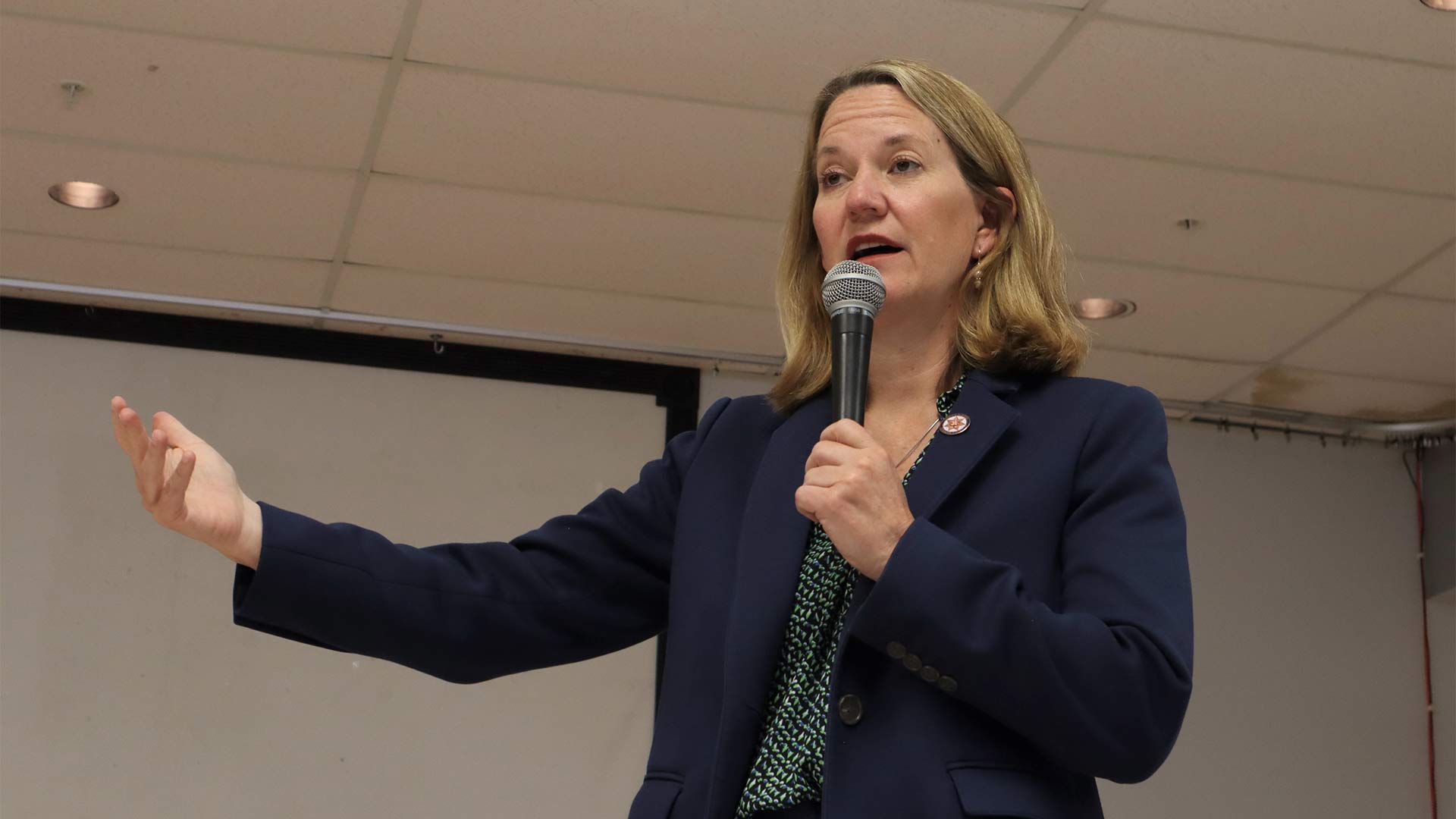 Arizona Attorney General Kris Mayes asked Cochise County residents to share their thoughts on the Kroger and Albertsons merger agreement at the Ethel Berger Center. July 26, 2023.
Arizona Attorney General Kris Mayes asked Cochise County residents to share their thoughts on the Kroger and Albertsons merger agreement at the Ethel Berger Center. July 26, 2023.
Arizona’s Attorney General issued a strong warning to the Cochise County Board of Supervisors about ongoing open meeting law violations, writing in a letter to the board that she will consider any additional complaints she receives as further evidence.
Attorney General Kris Mayes says that she continues to receive complaints about the board and potential open meeting law violations, with many that center on Republican Supervisor Tom Crosby.
In the letter sent to the board Monday, Mayes wrote that many of the complaints date to more than a year ago. She said she is concerned about Crosby’s conduct and that the evidence submitted to her office indicates that he has repeatedly ignored legal advice from the County Attorney about potential open meeting law violations.
The letter concluded that any additional potential open meeting law violations will be considered as further evidence in her ongoing investigation of the board’s conduct and she will pursue all penalties available under the law and “up to and including 'remov[al of] the public officer from office' if appropriate.”
Arizona law says that if a court determines that a public officer intended to deprive the public of information and knowingly violated open meeting law, the court can remove the public officer from their office.
This letter follows two others sent to the Cochise County Board of Supervisors by the Attorney General's Office about potential open meeting law violations earlier this year. The letter sent to the board in February raised concerns about the board's conduct in 2022, which lists three instances that the Attorney General received complaints about the board violating open meeting law.
The first instance alleges that in November 2022, Supervisors Crosby and Peggy Judd met in a private, a meeting that was not publicly noticed, to file a lawsuit against then County Elections Director Lisa Marra in an effort to get her to conduct a 100% hand count audit of the 2022 General Election. The letter says that the complaint also alleges that the two supervisors met yet again without public notice a few days later to withdraw the lawsuit. Marra later resigned from her position in January, with her resignation finalized in February. The county was given 15 days to address Marra's grievances of a hostile work environment. Marra now is the Deputy State Elections Director for the Arizona Secretary of State's office.
The last two instances refer to Supervisor Crosby's comments and conduct in two other public meetings. The first refers to Crosby's comments during the board's July 26, 2022 flood control district meeting, where Crosby discussed topics outside the noticed meeting topics. Crosby discussed and questioned the legitimacy of the San Pedro Riparian National Conservation Area (SPRNCA) during the board’s discussion of the Coyote Wash Stormwater Management Project.
Crosby said in that meeting that “All of this is based on the existence of the SPRNCA, which I say is fraudulent.”
According to the Bureau of Land Management’s website, Congress designated the riparian area as the San Pedro Riparian National Conservation Area on November 18, 1988. The main purpose of this designation is to protect the desert ecosystem.
Crosby continued to discuss and question the validity of SPRNCA instead of discussing the agenda item referring to funds for the Coyote Wash Stormwater Management Project, which provoked Chief Civil Deputy County Attorney Christine Roberts to interject a warning to Crosby about potentially violating the open meeting law.
The second instance refers to Crosby's statements in an April 5 board meeting, where Crosby diverged off the topic of the item on the agenda — which referred to extending an agreement between the Cochise County Health and Social Services and the Arizona Department of Health Services. Crosby made comments regarding natural immunity for those who are not vaccinated for COVID-19.
Another concern about a potential open meeting law violation came in a letter from the Attorney General's Office set in March of this year. That letter raised concerns about the board's conduct during their February 28 meeting, when the board was discussing their agreement to have the Cochise County Recorder oversee the elections department in the interim until an elections director was hired.
When discussion began on the agreement to shift administrative authority over the county elections department to Cochise County Recorder David Stevens, Crosby referenced two different versions of the agreement, calling one “the Crosby” version and the second the “Stevens” version. Supervisor Ann English indicated in that meeting that the public was not aware of the changes made from one version of the agreement to the next and that such changes were not reflected in the version of the agreement posted for the public.
The Attorney General's office then sued the board for the agreement, alleging that the agreement illegally handed over the board’s statutory authority over elections to the county recorder. But the state lost that argument, as a judge denied the state's motion for a preliminary injunction on the agreement. Since then, Stevens acted as the Interim Elections Director and ran the county's special election on the creation of a jail district and to enact a half-cent sales tax for 25-years to pay for a new county jail. 51.47% of voters approved the jail district and sales tax.
The board approved the appointment of a new elections director, Bob Bartelsmeyer, in April amid concerns from constituents about his qualifications and social media posts about the 2020 election.


By submitting your comments, you hereby give AZPM the right to post your comments and potentially use them in any other form of media operated by this institution.